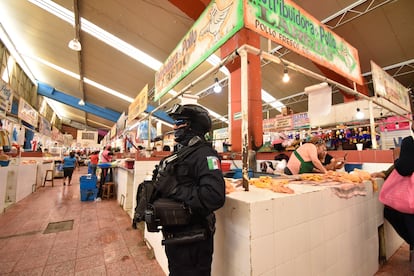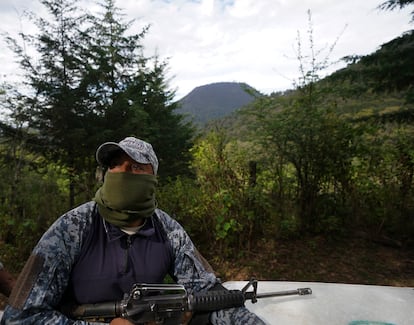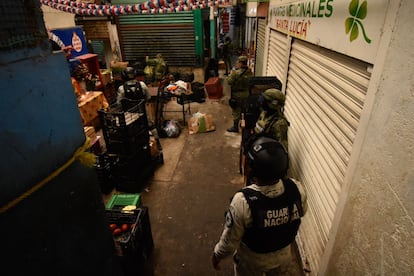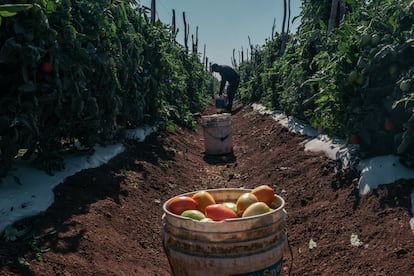From chickens to cabs: Drug cartels expand across the Mexican economy
By forcing their way into more and more sectors, organized crime has become ‘a dominant economic cartel,’ according to analysts

The term “narco,” used to refer to drug trafficking cartels, has long since been replaced by the broader concept of organized crime in Mexico. The reason is that criminal groups have branched out into other forms of crime, including human trafficking, but also into various kinds of day-to-day activities that work as a kind of reverse money laundering operation, penetrating legal businesses to operate them illegally. Narcos now operate cab and bus networks and have interests in sectors such as the distribution of limes and the production of corn tortillas, the sacred heart of the country’s gastronomy.
In 2022, 27.4% of households in Mexico reported that at least one of their members was a victim of crime, according to the most recent National Survey of Victimization and Perception of Public Security. But considering that the reach of the cartels now extends even to food, many more Mexicans have been the victims of overpaying for avocado than would be the case in a market free of organized crime. And they have done so, in all likelihood, without even knowing it.

In this context, the Employers Confederation of the Mexican Republic (Coparmex) will participate in a meeting on September 21 and 22 to discuss solutions to the problem of organized crime. “This country can’t take it anymore,” Coparmex said in a recent statement. “It cannot continue on the same path of overflowing violence.” Such associations fear seeing more businesses taken over by force, and of the economy being handed over to criminals. The meetings, to be held in Puebla, are called the National Dialogue for Peace.
The Institute for Economics and Peace (IEP), a global non-profit research and analysis center, estimated the economic impact of violence in Mexico at 4.6 trillion pesos ($230 billion) in 2022. This is equivalent to 18.3% of Mexico’s GDP. In the same year, the federal government spent 0.6% of its GDP on security, according to the IEP.
In terms of per capita impact, the figure is more alarming. On average, every Mexican experienced an economic loss of 35,705 pesos ($2,198), more than double the average monthly salary in the same year. In addition, crime in food production chains adds two percentage points to the country’s inflation rate, according to an estimate by the Laboratory of Analysis in Commerce, Economics and Business (Lacen) at the National Autonomous University of Mexico. “Organized crime has become a dominant economic cartel,” Lacen stated. A review of the headlines over the past year demonstrates this.
Chicken
Images of an empty market in Chilpancingo, the capital of the state of Guerrero, flooded social networks last year. According to various media reports, eight people involved in the sale and distribution of chicken for human consumption were killed in a single week. There was also a reported incident in which a group of armed men murdered a chicken distribution businessman in full view of buyers and diners. In the following weeks, chicken became scarce in the locality. Markets and chicken shops closed down, taking with them local eateries and fast-food restaurants.
In the State of Mexico and Michoacán, there have been shortages and increases in the price of chicken due to extortion by organized crime, as vendors have no choice but to pass the bill on to consumers in order to preserve their business.

Fish
In March 2022, Congress convened a panel of specialists to analyze the main causes behind the expansion of illegal fishing. The primary reason was found to the lack of inspection and the second, the presence of organized crime, which are potentially interlinked. “The increased presence of organized crime that uses fishing as a screen totally exceeds the capacity and powers of civilian government institutions in the sector,” says the report resulting from the meeting.
The takeover of fishing, both legal and illegal, is centered in the Gulf of California and in the states of Sinaloa, Sonora, Baja California, and Baja California Sur, according to an investigation by media outlet Contralínea. But in reality, it affects all of Mexico’s coastlines, from Tamaulipas in the north to Yucatán in the east.
Transportation
The National Transporters Association (ANTAC) reported in July that cargo theft accounts for 2.3 billion pesos ($137 million) in losses each year. Businessmen, however, claim that the amount is much higher. According to logistics security company AI27, annual theft is close to $300 million. The authorities registered 13,199 crimes committed against carriers last year, an increase of 6.7% compared to 2021.
Public transport is also prey to organized crime. Between July and the first week of August, 14 bus drivers were killed in the municipality of Chilpancingo alone. In Michoacán, organized crime collects 21 million pesos ($1.21 million) through the extortion of public transport passengers, according to a report published by the Excélsior newspaper. Huachicol, as gasoline theft is known, is such a widespread problem that it has been a focus of President Andrés Manuel López Obrador’s administration.
In January, cab drivers in the tourist city of Cancún reacted to the permit granted to Uber to operate legally in the state of Quintana Roo with blocked roads and violence against Uber drivers, passengers, and the authorities. Weeks later, unconfirmed reports in both local and national media suggested that this was due to the cab drivers’ union being co-opted by organized crime. This coincided with a report by international security intelligence firm Insight Crime, which, since 2013, has warned that cab drivers were being targeted by criminal organizations. The aim of the cartels is to force them to transport and sell drugs, Insight Crime said.

Fruits and vegetables
Last year, Lacen identified the fruits and vegetables that have suffered the highest rate of inflation as a result of criminal influences. In just a fortnight, tomatoes rose 16.7%, serrano peppers 15%, and avocados 4.73%. This year, the state of Nuevo León saw a 50% jump in the price of limes between August and September, according to data from the Ministry of the Economy.
This phenomenon has its roots in Michoacán, a state that exports and supplies much of the country with agricultural products. On September 11, three lime cutters were killed in an armed attack that authorities said was carried out by organized crime in the municipality of Tepalcatepec. Zamora, another lime-growing municipality, has become the epicenter of disputes in Michoacán between rival drug cartels, according to the IEP. The same applies to other crops grown in Michoacán.
In 2014, then-president Enrique Peña Nieto proposed that the Federal Police Gendarmerie, which he created, deploy some 5,000 agents in agricultural areas across the country to protect the productive cycles of tomatoes in Sinaloa and sugar cane in Tamaulipas.
The (sacred) tortilla
The centerpiece of Mexican gastronomy, the corn tortilla, is also suffering from threats and extortion by organized crime. At the end of 2021, a strange incident occurred in Guerrero. By means of posters in the establishments, a criminal group ordered tortilla shop owners to lower their prices, while also charging them protection money for allowing them to operate. Last year, the president of the National Tortilla Council, Homero López, told EL PAÍS: “[The criminals] believe that we raise the price of our own volition, especially in the Guerrero area, where transportation costs are higher due to insecurity.”
Sign up for our weekly newsletter to get more English-language news coverage from EL PAÍS USA Edition
Tu suscripción se está usando en otro dispositivo
¿Quieres añadir otro usuario a tu suscripción?
Si continúas leyendo en este dispositivo, no se podrá leer en el otro.
FlechaTu suscripción se está usando en otro dispositivo y solo puedes acceder a EL PAÍS desde un dispositivo a la vez.
Si quieres compartir tu cuenta, cambia tu suscripción a la modalidad Premium, así podrás añadir otro usuario. Cada uno accederá con su propia cuenta de email, lo que os permitirá personalizar vuestra experiencia en EL PAÍS.
¿Tienes una suscripción de empresa? Accede aquí para contratar más cuentas.
En el caso de no saber quién está usando tu cuenta, te recomendamos cambiar tu contraseña aquí.
Si decides continuar compartiendo tu cuenta, este mensaje se mostrará en tu dispositivo y en el de la otra persona que está usando tu cuenta de forma indefinida, afectando a tu experiencia de lectura. Puedes consultar aquí los términos y condiciones de la suscripción digital.









































